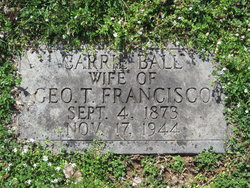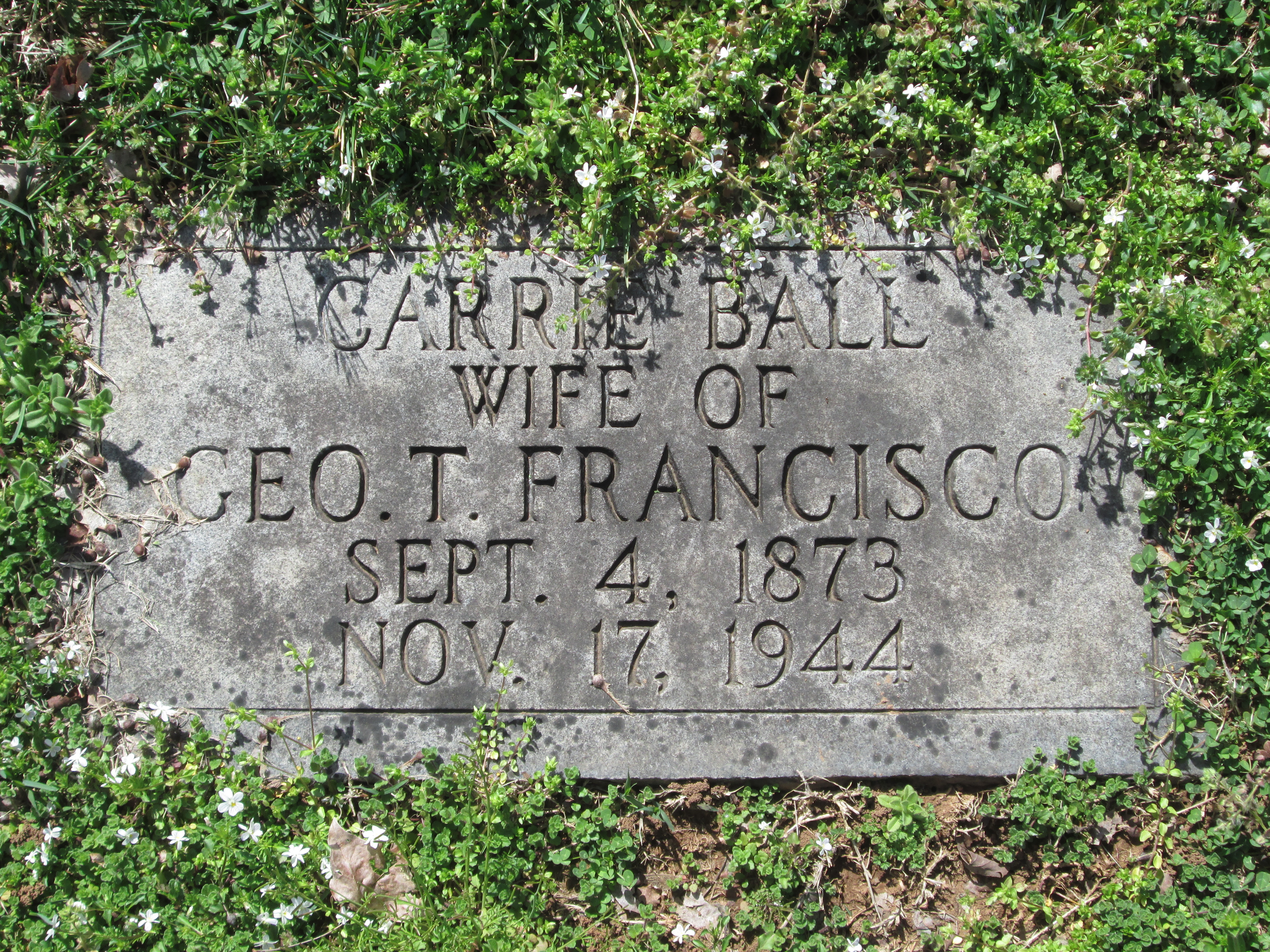She was the daughter of John W. and Elizabeth Ball, of Johnson City, Tennessee. She was converted when a child and united with the Munsey Memorial Methodist Church in which she continued a faithful and active member until united in marriage to Dr. G. T. Francisco September 19, 1894. In September 1944 they celebrated with their children and friends their golden wedding anniversary after fifty beautiful years of delightful companionship.
There were born to Dr. and Mrs. Francisco seven children, six daughters and one son. They are Mrs. J. V. Hodge. Kingsport, Tennessee; Mrs. P. L. White, Knoxville, Tennessee, and her twin brother, Earl Francisco. Bristol-Virginia; Mrs. D. W. Campbell, Knoxville, Tennessee; Mrs. V. C. Gilbert, Knoxville, Tennessee; Mrs. Clyde Wayland. Knoxville, Tennessee, and Mrs. W. C. Bruce, (Deceased), Knoxville. Tennessee.
Mrs. Francisco was an active and an efficient leader among young people through her childhood and youth, as also after she married Dr. Francisco in all places where he was appointed to serve as pastor. District Superintendent, Sunday School Evangelist, and Tennessee Wesleyan College Field Agent. She was known and loved as an enthusiastic worker in alt the organizations of the Church, especially in the Women's Home and Foreign Missionary Societies. She gave God and her Church a large place in her heart and life until the radiant morning when her beautiful spirit went to join the Church Triumphant, and to mingle her voice with the unceasing and celestial melodies of eternity.
This noble wife and mother was widely known for her generosity and Christ-like kindness, always helping the poor and friendless ones around her. She was like the "Elder Sister" in Whittier's "Snow-Bound," "Keeping with many a slight disguise the secret of her self-sacrifice .... How many a poor one's blessing went with her beneath the low green tent whose curtains never swing outward." She led and lifted always to higher and better things.
Wherever her home was, she was Queen, and made it a shrine of love and devotion, restful composure and contentment, and she, with her husband and children rejoiced in its sunshine and gladness, — the humble, cozy and homey little heaven on earth as it was to them until that morning when the sweetest and brightest star faded and vanished for a while, — but just for a while, for she and they remembered the confident "Henceforth" in Saint Paul's farewell to Timothy, and made it their own.
As friend and neighbor she was the embodiment of many lovely virtues. We may say truly of her as Tennyson said to his mother in his "Princess:'"
" I love her . . , one
Note learned, save in gracious household ways,
Not perfect, nay. but full of tender wants;
No angel, but a dearer being, all dipt
In angel instincts, breathing Paradise."
One of the noblest attributes of Mrs. Francisco was that she rejoiced in her heart and felt highly honored of God in being a mother. She loved her own and everybody's children. And like her Master she ]X)ured her blessings and her love into their lives. She felt that the highest and holiest throne on earth is the throne of Christian motherhood. For,
"Her children rise up and call her blessed;
Her husband, also, and he praiseth her, saying
Many daughters have done worthily,
But thou excellest them all."—Proverbs 31
And now. as the writer of this memoir sits by the parsonage window and looks out into the grove of large oaks in the Church yard, he can see a lonely dove on a limb, and hear it sadly but hopefully cooing, cooing, cooing for its mate which does not answer. Its heart seems to swell as it looks this wav and that way, and its cooing grows more plaintive. And \'et there is no answer. And do we not sometimes call and call for those who once sweetened and sanctified our existence; and in the stillness of the night the hungry hand reaches out for the other self which is not there? And do we not have sacred emotions, born of memory and of love which time can never extinguish, rise up in our souls like the emotions expressed in that very human little poem of Ethel Maude Colson. as quoted by Bisho]5 Richard J, Cooke, in his sweet little Book. "The Wingless Hour?"
"Since she went ... . home
The saddened world has never seemed so bright;
There is less splendor in the morning's light
And duller now the radiant moonbeams shine.
All nature's joys come now to slower birth.
And thou hast lost. O tender morning earth
The glory that was thine.
"Since she went ... . home
The dragging days seem now so dear and long;
A hint of sadness chills the gayest song.
A plaintive note in every sound I hear.
Even the sunlight's rays of purest gold.
Like all the world, seem something dull and cold,
Missing her presence dear. "Since she went ... . home
So large a world to lose so much,
In one small woman's face and voice and touch,
The simple magic of her tender smile!
So full a world to have so- empty grown
For one woman's quiet soul and tone,
And yet .... twill empty be for such a while
Since she went .... home."
Written by: William F. Pitts – Holston Conference Journal - 1945
She was the daughter of John W. and Elizabeth Ball, of Johnson City, Tennessee. She was converted when a child and united with the Munsey Memorial Methodist Church in which she continued a faithful and active member until united in marriage to Dr. G. T. Francisco September 19, 1894. In September 1944 they celebrated with their children and friends their golden wedding anniversary after fifty beautiful years of delightful companionship.
There were born to Dr. and Mrs. Francisco seven children, six daughters and one son. They are Mrs. J. V. Hodge. Kingsport, Tennessee; Mrs. P. L. White, Knoxville, Tennessee, and her twin brother, Earl Francisco. Bristol-Virginia; Mrs. D. W. Campbell, Knoxville, Tennessee; Mrs. V. C. Gilbert, Knoxville, Tennessee; Mrs. Clyde Wayland. Knoxville, Tennessee, and Mrs. W. C. Bruce, (Deceased), Knoxville. Tennessee.
Mrs. Francisco was an active and an efficient leader among young people through her childhood and youth, as also after she married Dr. Francisco in all places where he was appointed to serve as pastor. District Superintendent, Sunday School Evangelist, and Tennessee Wesleyan College Field Agent. She was known and loved as an enthusiastic worker in alt the organizations of the Church, especially in the Women's Home and Foreign Missionary Societies. She gave God and her Church a large place in her heart and life until the radiant morning when her beautiful spirit went to join the Church Triumphant, and to mingle her voice with the unceasing and celestial melodies of eternity.
This noble wife and mother was widely known for her generosity and Christ-like kindness, always helping the poor and friendless ones around her. She was like the "Elder Sister" in Whittier's "Snow-Bound," "Keeping with many a slight disguise the secret of her self-sacrifice .... How many a poor one's blessing went with her beneath the low green tent whose curtains never swing outward." She led and lifted always to higher and better things.
Wherever her home was, she was Queen, and made it a shrine of love and devotion, restful composure and contentment, and she, with her husband and children rejoiced in its sunshine and gladness, — the humble, cozy and homey little heaven on earth as it was to them until that morning when the sweetest and brightest star faded and vanished for a while, — but just for a while, for she and they remembered the confident "Henceforth" in Saint Paul's farewell to Timothy, and made it their own.
As friend and neighbor she was the embodiment of many lovely virtues. We may say truly of her as Tennyson said to his mother in his "Princess:'"
" I love her . . , one
Note learned, save in gracious household ways,
Not perfect, nay. but full of tender wants;
No angel, but a dearer being, all dipt
In angel instincts, breathing Paradise."
One of the noblest attributes of Mrs. Francisco was that she rejoiced in her heart and felt highly honored of God in being a mother. She loved her own and everybody's children. And like her Master she ]X)ured her blessings and her love into their lives. She felt that the highest and holiest throne on earth is the throne of Christian motherhood. For,
"Her children rise up and call her blessed;
Her husband, also, and he praiseth her, saying
Many daughters have done worthily,
But thou excellest them all."—Proverbs 31
And now. as the writer of this memoir sits by the parsonage window and looks out into the grove of large oaks in the Church yard, he can see a lonely dove on a limb, and hear it sadly but hopefully cooing, cooing, cooing for its mate which does not answer. Its heart seems to swell as it looks this wav and that way, and its cooing grows more plaintive. And \'et there is no answer. And do we not sometimes call and call for those who once sweetened and sanctified our existence; and in the stillness of the night the hungry hand reaches out for the other self which is not there? And do we not have sacred emotions, born of memory and of love which time can never extinguish, rise up in our souls like the emotions expressed in that very human little poem of Ethel Maude Colson. as quoted by Bisho]5 Richard J, Cooke, in his sweet little Book. "The Wingless Hour?"
"Since she went ... . home
The saddened world has never seemed so bright;
There is less splendor in the morning's light
And duller now the radiant moonbeams shine.
All nature's joys come now to slower birth.
And thou hast lost. O tender morning earth
The glory that was thine.
"Since she went ... . home
The dragging days seem now so dear and long;
A hint of sadness chills the gayest song.
A plaintive note in every sound I hear.
Even the sunlight's rays of purest gold.
Like all the world, seem something dull and cold,
Missing her presence dear. "Since she went ... . home
So large a world to lose so much,
In one small woman's face and voice and touch,
The simple magic of her tender smile!
So full a world to have so- empty grown
For one woman's quiet soul and tone,
And yet .... twill empty be for such a while
Since she went .... home."
Written by: William F. Pitts – Holston Conference Journal - 1945
Family Members
Sponsored by Ancestry
Advertisement
Advertisement








